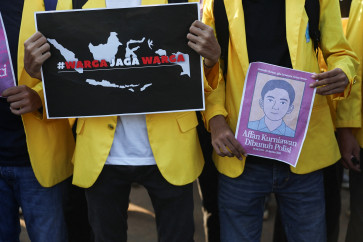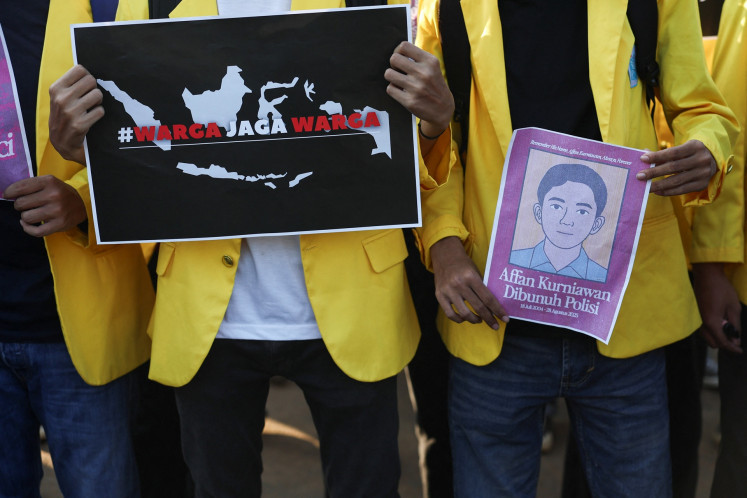Popular Reads
Top Results
Can't find what you're looking for?
View all search resultsPopular Reads
Top Results
Can't find what you're looking for?
View all search resultsTapping pressure points to address all ailments
A man sat inhaling the fresh air, holding a cigarette butt in his hand
Change text size
Gift Premium Articles
to Anyone
A man sat inhaling the fresh air, holding a cigarette butt in his hand. "I don't like this anymore," he claimed.
Fifteen minutes earlier, he was smoking the cigarette. But after a man lightly tapped some pressure points on the smoker's face and upper body with his fingers, he rejected the cigarette when asked to smoke.
Suryono is a 47-year-old man who has been smoking for 20 years. He is a street vendor who sells noodle soup in Bintaro residential area. "I don't know, the cigarette tastes bad and I don't think I have a craving to smoke at all."
What has fingers tapping got to do with his sudden dislike of cigarettes?
Endy Fatah Joesoef said Suryono had SEFT therapy, "which typically takes around 5 to 10 minutes".
SEFT is Spiritual Emotional Freedom Technique, a method to heal physical and emotional problems, Endy said. He is a SEFT practitioner from the LoGOS Institute.
From phobias, autism and diabetes to drug abuse, SEFT could be used as a painless and rapid treatment, he said. "Often one session is sufficient."
Two young female smokers had the same finger-tapping therapy a few minutes after Suryono's session. They were handled by different practitioners.
They were still smoking cigarettes a few seconds before the tapping began. They both experienced the same result: They claimed they did not want to smoke at all, even when offered their favorite cigarettes. One woman pushed the cigarette away from her.
The SEFT technique was developed by Ahmad Faiz Zainuddin, based on EFT, or Emotional Freedom Technique. Ahmad learned the EFT method from Australian psychologist Steve Wells.
The EFT method itself was originally developed by North American Gary Craig, Endy said.
On his website Craig wrote, "I am neither a psychologist nor a licensed therapist. Rather, I am a Stanford engineering graduate and an ordained minister, and although we don't pound the table for God here, I do come at this procedure from a decidedly spiritual perspective."
He said he was a member of a church in South California that embraces all religions.
The public can learn the SEFT healing for a certain fee, and the Jakarta-based LoGOs Institute offers free healing sessions for communities.
The points tapped on Suryono's face and body were meridian points relating to certain organs of the body, he said.
"In acupuncture or acupressure system, there are 361 points, while SEFT therapy only deals with 9 to 18 points," he said.
Suryono had the therapy on the first nine points only.
To heal a person using SEFT, acupuncture method treats certain points individually or in combination for each illness, while SEFT practitioners tap the same points each time no matter what the health or emotional problem is.
Using the SEFT method, the difference in each therapy for different ailments lies with the initial step, which is the will to heal, he said.
It is actually very simple, while the benefits can be holistic, he said. "Diabetic patients can see the difference immediately after one treatment, with an instant drop of 100 points in their blood sugar level."
M. Ilyas Ahkab, a coordinator of the SEFT center in Bintaro, said, "We have several centers in Jakarta and Surabaya offering the healing service to the public, while we routinely hold open sessions for communities such as this one."
The institute offered Tangerang's Bintaro and Pondok Aren residents SEFT therapy for free last Sunday, in a small booth at a morning exercise fair participated by hundreds of people, at the Pondok Aren district's football field.
Suryono was given the therapy in the SEFT booth at the fair.
Dian Serly, another practitioner who is also a corporate social responsibility officer of LoGOs Institute, said LoGOS reserved 20 percent of its profits for social service.
"Even those receiving healing sessions in the SEFT centers are not asked for a certain fee, they are free to give any amount they like, and they don't have to pay if they cannot afford it.
"The institute gives 3-day training workshops in SEFT, and they come with a money-back guarantee: If after the trainings you decide it did not give you any benefits, 100 percent payment is returned. Or after 40 days practicing the method and you do not see any improvement to your conditions, 100 percent returned," she said.
"We have given SEFT treatments to inmates of Cipinang and Paledang penitentiaries," she said.
On Jan. 13, 300 prisoners in Paledang, Bogor, were trained to practice SEFT method on themselves and to other people. They would have a useful skill to help people when their detention terms were over, she said.
Last year, 500 prisoners in Cipinang prison in Jakarta also had the same treatments and trainings. "They were not only smokers, but drug users too."
Fuad Baradja, head of education and awareness division of the Indonesian Smoking Control Foundation (LM3), said, "Community service like this is excellent and my organization always welcome any activity to prevent the spread of bad impacts from cigarettes."
The state does not provide us protection from cigarettes, he said.
"Already 160 countries around the world have ratified the FCTC (Framework Convention for Tobacco Control)," Fuad said. "Our country is the only one in Asia who has not ratified the convention." (iwp)










